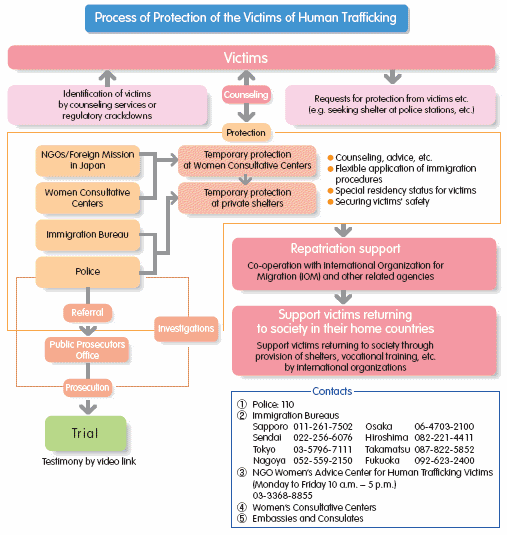


The act on punishment of organized crime, control of crime proceeds and other matters has been amended to allow forfeiture (confiscation and collection of equivalent value) of proceeds belonging to victims of asset-related crime like fraud or receipt of high interest rates (i.e. breach of the Investment Act) if the criminal activity was conducted as an organizational group or if money-laundering such as concealment of the property in false accounts was committed.
Criminal proceeds and assets* stripped from the offender(s) in such a manner are monetized and maintained as a compensation fund, from which benefits can be paid to victims of the pertinent crime. This system is called “Procedure for payment based on the recovery of the property of crime victims.”
* The victim’s properties which are confiscated by the foreign court and are transferred to Japan are treated in the same way as mentioned above.
 |
Who can receive compensation benefits? | |
 |
Besides those recognized in a criminal court to be victims of asset-related criminal activity, victims of series of asset-related crimes can also claim compensation*. In addition, the heirs of such victims are eligible to receive compensation. On the other hand, people who acquired unlawful gains from accomplices of the offenders or criminals cannot claim compensation. *Such crimes will not be acknowledged in court. Public prosecutors will determine which case will fall within the scope for “series of asset-related crime” on a case-by-case basis.
 |
|
 |
How much compensation can I receive? | |
 |
The maximum amount of compensation depends on the actual loss suffered by each individual victim. If the recovered amount is less than the total loss amount, the compensation benefit fund will be divided among the victims on a pro-rata basis (i.e. in proportion to each victim’s loss.). Moreover, expenses, etc. will be paid out of the fund before it is divided to victims. 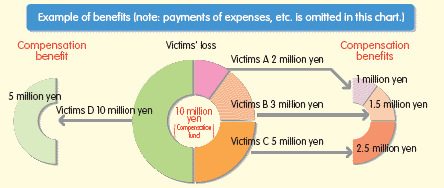 |
|
 |
What would I need to do to receive such benefits? | |
 |
After the crime proceeds have been forfeited from the offender(s) by a criminal court, the public prosecutor will determine which crimes will be the subject of compensation and the deadline for submitting claims and initiate the payment procedure. The initiation of the procedures will be made public in the Official Gazette*. In such case where the prosecutor is aware of individual beneficiaries, the prosecutor will contact them individually. If the compensation procedure has already been initiated, please fill in a claim form with the required information. The form will be available at your Local Public Prosecutors Office, or you can also download the form from the Ministry of Justice’s website (https://www.moj.go.jp/) or the Public Prosecutors Office’s website (https://www.kensatsu.go.jp/). Please submit your form before the deadline, together with the necessary documents, to the public prosecutor who is in charge of the procedure (alternatively, you can also send the form via post). * This information will be also posted on the Public Prosecutors Office website.
|
|
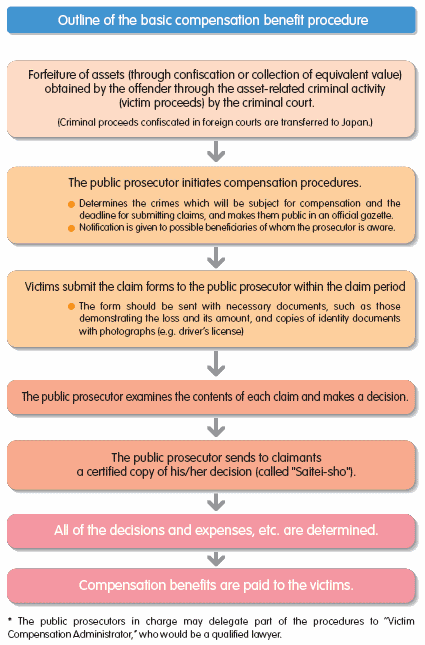

Victims, bereaved families and others who did not reach an agreement with the offender about the compensation must bring civil action in order to pursue their civil claim.
In the civil action, you must clarify the kind of judgments you are pursuing when suing the offender, and assert what kind of criminal activity the offender was responsible for, and what kind of loss was suffered due to the criminal activity. Further, if the offender objects to the claim, you must submit evidence to prove your claim.
If you want professional legal advice about the procedure, bar associations and other organizations can offer legal counseling. Also, should you have any question, please contact the Victim Support Officer at the Public Prosecutors Office.
In a civil action, as in the criminal trials, accompanying persons, witness screens, and testimony by video link are available (refer to “Examination of witnesses”).
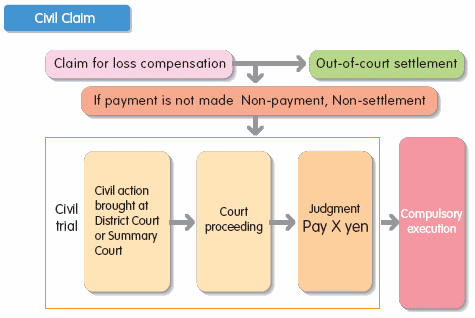

Some local public entities (i.e. prefectural housing and municipal housing) provide public accommodation for, prior to others, those who can no longer live in their previous houses due to criminal activity if their income is below a certain level (note: people living alone, except victims of domestic violence, are excluded from this policy).
In addition, as some local public entities allow those who are in an emergency for public housing, and single people to live in public housing, please contact your prefectural or municipal public housing administrative office for more details.
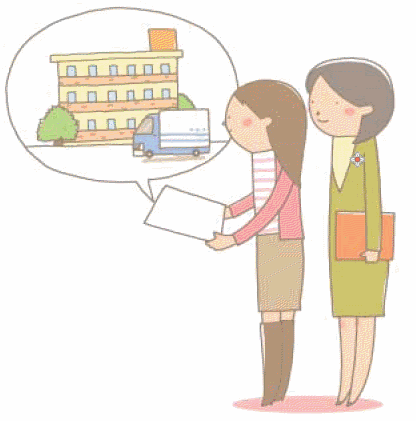

Human trafficking is a serious crime which violates the human rights of the victims. In Japan, all of the relevant organizations are working on prevention and elimination of human trafficking, and protection of victims, based on the anti-human trafficking action plan. The Public Prosecutors Office deals with such crimes aggressively. Please see the following diagram to find out about the protection of the victims of human trafficking.
